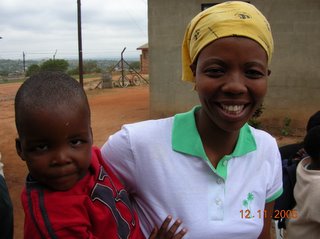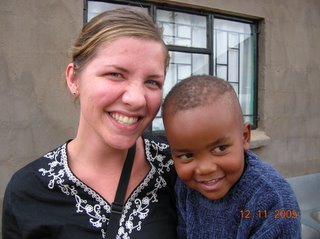today
 Greetings,
Greetings,I am going to open with a poem that I like a lot:
(this is a shot of the sunsets here taken while I was climbing a local mountain, Legogote)
Today
I thought
I would like
To go to Africa
Yes, I will go to Kenya
And see if time
Has stood still
Where at least
The walk
Is on the ground
And all comes
To a sudden halt
At Dusk
And sounds
Come from the voice
And travel a mile or two
And strength comes from the family
Near to you
Yes, Today
I thought
I would like to go to Africa
Sallie Lanier, 1995
I enjoy that poem because you can almost hear the author patiently pondering her thoughts. Read it really slowly, and you will begin to feel Africa. The words illustrate life here. Life does come to a halt at dusk in the rural community, and strength and meaning is drawn from family, from those in relationship with you. People greet EVERYBODY. Not just your best friend who you happen to see on a subway
 . I was speaking with my good friend Gugu about life in Canada, and I told her that we don’t greet in Canada (this is a picture of Gugu and her son). Like I mentioned last time, you greet EVERYONE in Africa. Unless they are sketchy men who are trying to get you to marry them. It can take you 20 minutes to walk down the street, simply because you cannot pass a person with out saying hello, how are you? How is your family?, and waiting for the appropriate response. In Canada, you walk to work or class or car in silence, not making eye contact, untilyou get to your destination. When I shared this with Gugu, she sat there, mouth open, aghast. She said to me, don’t people get lonely in your country with no one to speak to them? Don’t they get sad? She makes me think…
. I was speaking with my good friend Gugu about life in Canada, and I told her that we don’t greet in Canada (this is a picture of Gugu and her son). Like I mentioned last time, you greet EVERYONE in Africa. Unless they are sketchy men who are trying to get you to marry them. It can take you 20 minutes to walk down the street, simply because you cannot pass a person with out saying hello, how are you? How is your family?, and waiting for the appropriate response. In Canada, you walk to work or class or car in silence, not making eye contact, untilyou get to your destination. When I shared this with Gugu, she sat there, mouth open, aghast. She said to me, don’t people get lonely in your country with no one to speak to them? Don’t they get sad? She makes me think…So I have begun to work with the orphan programs here over the past little while. In South Africa alone, there are 1000 children orphaned every week by the AIDS virus. MHBC began to look at orphan care just 4 years ago, and since then, we have taken over the care of over 1700 children. How it works is when a patient becomes ill and near death, MHBC (Masoyi Home Based Care) speaks with them about where they would like their child to go when they pass away. The social workers begin to prepare the child for the death of their parent, and we take pictures of the family all together so the child can have a physical memory of their parents. After the parent passes away, the child is designated to a volunteer from the community who becomes like an auntie to the child. In Africa, there is a huge extended family structure, and part of that structure is aunties. These are women who are like mentors and big sisters and protectors to the kids. So each child has a volunteer who they know personally, who lives near their home, that checks in on them regularly and who they can go to in the case of physical abuse, poor living conditions, and such. For the most part, the orphaned children live with grannies or close family members, but if the child has no home to go to, MHBC also has little foster homes set up. These are houses with 6 kids and one auntie who cares for them, providing good food and parenting. We always keep children from the same parents together as much as possible…
I was able to visit the daycares run by MHBC and work with the kids for a few days. Many of
 the kids are touch-starved, meaning that they don’t get physical affection at home. There was this beautiful little girl, Specicio, which means gift from God, that I met at the daycare. I placed my hand on her head while the daycare instructor was telling the kids how to do the craft for the day. She slowly molded into my hand, starved of touch, and sat on my lap for over 2 hours that afternoon. I definitely fell in love with at least 5 children over this past week, one of them is pictured here. He was too young to ask his name, and I couldn’t figure out where his caregivers where, but I would guess he is about 2 or 3.
the kids are touch-starved, meaning that they don’t get physical affection at home. There was this beautiful little girl, Specicio, which means gift from God, that I met at the daycare. I placed my hand on her head while the daycare instructor was telling the kids how to do the craft for the day. She slowly molded into my hand, starved of touch, and sat on my lap for over 2 hours that afternoon. I definitely fell in love with at least 5 children over this past week, one of them is pictured here. He was too young to ask his name, and I couldn’t figure out where his caregivers where, but I would guess he is about 2 or 3.The daycares are run to give the grannies and caregivers a break for a few hours each day, because many grandmas are caring for as many as 7 to 12 kids. Which brings another concern for groups who are trying to help – many of these grandmothers are not healthy themselves, and the orphans face the chance of being orphaned again when they pass away.
A large part of what I have been dealing with is how to look at the social tidal waves that are left in the wake of AIDS…that poem spoke of how strength comes from the family. AIDS has taken away an entire generation of parents and aunties who are the people that teach these kids about life…how to farm, how to pick a good husband or wife…how to plait your hair or how to dance…whole cultures in Africa face an identity crisis as these kids are growing up.
My work is starting to take me away from the people side of things, and into the background, which I had anticipated. As a non-governmental organization (NGO) we receive funding to run programs from USAID, Visionledd, and other international groups. There is a lot of bookkeeping and logistical coordination that has to happen in order for the funds to be available…My days are now going to be divided between helping with the annual report preparations and the hands-on work in the community.
I wish that I knew how to share everything that I feel and see…I don’t want my postings to be negative but I want to be honest about what I see. Many of the situations I walk into make me uncomfortable, and they make me long for a pumpkin spice latte from Starbucks and a good book to escape into. But I feel this incredible burden to bear witness to what is happening here – to tell of the endurance and the beauty of the human spirit. To tell of the faith and love and hope that I have seen and do see amongst the people of Africa who have been largely forgotten by CNN and by the Western world. To tell people that we have much to learn from this way of life, from the simplicity of value systems, from the value of tradition and family and relationships. But to communicate as well that this way of life is in danger…in many communities, it is in crisis. I pray that you don’t read my message and go away feeling guilty for your blessings, but rather go away wanting to learn more about what happens here. Maybe even come to visit me…but please keep reading. Keep journeying alongside me…
Grace and peace,
maeghan


